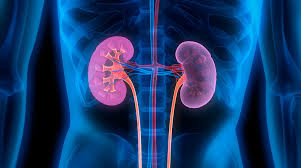
KIDNEY cancer, which is also known as renal cancer, is a type of cancer that starts in the kidneys and can spread to other organs.
In kidney cancer, cells in the kidney begin to grow uncontrollably forming tumours, which can spread to and damage other organs.
The kidneys are bean-shaped organs in your body, whose main purpose is to remove waste from the blood and excrete it through the urine.
“Kidney cancer is ranked the 14th most common cancer world-wide according to the World Cancer Research Fund,” explained Cimas Health group doctor Shecriton Muguza.
He added that the Global Epidemiology of Kidney Cancer states that there are about 400 000 new cases of renal cancer world-wide each year and a world-wide mortality rate of 175 000 per year.
World Kidney Cancer Day, which was commemorated yesterday, is recognised annually on the third Thursday of June. Its aim is to raise global awareness about kidney cancer providing education on kidney cancer, its impact and what people can do to curb it.
“Raising awareness about kidney cancer is essential to give people knowledge about kidney cancer and to enable early detection of the cancer as well as early intervention strategies that can help improve survival,” Dr Muguza said.
“This year’s theme ‘Show your kidneys some love’ is important as there is need for guarding the health of your kidneys.
- Access to cervical cancer services improves
- Zim tops in cancer deaths
- Healthy lifestyle prevents kidney cancer
Keep Reading
“Start with regular exercise, eating healthy, quit smoking, avoid things that are toxic to the kidneys, such as excess intake of drugs called non-steroidal anti-inflammatory drugs and get your blood pressure and sugar levels checked and controlled.
“Everyone has a role to play in raising awareness about kidney cancer by sharing personal stories, getting involved in awareness campaigns, using orange ribbons and reading information about kidney cancer.
“The challenges in raising kidney cancer awareness include lack of dedicated funding towards kidney cancer programmes, non-specificity of kidney cancer symptoms as they occur in other conditions and focus on the other ‘big’ cancers.
“Lack of knowledge on kidney cancer and regarding it as an uncommon cancer is a hindrance to awareness programmes.
“There has been significant advance in kidney cancer research through a better understanding of the disease biology and developing new effective therapies. There are now new minimally invasive surgical techniques, ablative therapies and immunotherapy.
“Cimas actively shares knowledge about kidney cancer and encourages people to get involved in kidney cancer preventive strategies which include getting checked early once symptoms appear or get screened before symptoms appear if you are at risk,” Dr Muguza added.
He explained that the primary causes or risk factors for developing kidney cancer include smoking, obesity, high blood pressure, certain chemicals and some genetic conditions.
“Exposure to asbestos, benzene, cadmium and certain herbicides and pesticides has been linked to increased risk of developing kidney cancer. Risk of kidney cancer increases with age as people above 40 are at a higher risk,” Dr Muguza said.
“Kidney cancer is two times more likely to occur in males than females. Genetic factors or heredity play an important role in determining the risk of getting kidney cancer.
“Von Hippel Lindau syndrome is a typical genetic condition associated with an increased risk of developing kidney cancer as 40% of people with this condition will get renal cell carcinoma. If you have a close relative with kidney cancer, you have increased chances of getting the cancer,” he added.
Dr Muguza went on to say kidney cancer may show no symptoms at all in the early stages.
However, he said the most common symptom of kidney cancer is haematuria or blood in the urine, occurring in 40% of patients. Other symptoms include low back pain, flank or side abdominal pain and a lump in the abdomen.
“A varicocele which is a swelling of blood vessels in the testicle, usually the left side, may occur in renal cancer cases. General symptoms such as fever, fatigue, loss of appetite and unexplained weight loss may be experienced,” he added.
Diagnosing kidney cancer, Dr Muguza said, starts with suspecting it based on the symptoms. Full blood count, kidney function test, liver function tests and blood calcium are done.
“Imaging studies used to evaluate and stage kidney tumours may include urography, CT or MRI scanning, ultrasonography, arteriography and venography. Genomic screening can also assist determine the genetic risk profile of an individual,” he said.
“The different types of kidney cancer are renal cell carcinoma, transitional cell carcinoma and Wilms tumour. Wilms tumour is the most common type of kidney cancer in children.
“If left untreated, kidney cancer will spread to other parts of the body such as the liver, lungs, brain and bones. This spreading of the tumour to distant organs is called metastasis. Spontaneous regression of renal cell carcinoma has also been reported in some cases,” Dr Muguza said.
When it comes to treatment, he explained that surgical resection is still the only known curative treatment for localised renal cell carcinoma.
Dr Muguza said it was also used for palliation in metastasised disease.
“Use of minimally invasive techniques and robotic surgery are some of the latest advances in surgery. Radiofrequency ablation by a radiologist is an alternative for small tumours in some selected patients who are not candidates for surgery,” he said.
“Targeted therapy and immunotherapy are considered standard of care in patients with metastatic disease.
“Immunomodulatory therapies are also indicated for some cases. Chemotherapy and radiotherapy are also useful treatment interventions.”
Dr Muguza also highlighted that the stage of the disease determines outcomes. In early stage renal cell carcinoma, more than 50% of patients are cured, he said.
“According to the American cancer society, there is a 93% five-year survival in early stage disease. Early stage contained disease can be managed with less invasive therapies hence less morbidity and mortality. Prognosis is poor in stage four or advanced disease with only 15% five-year survival,” he said.
“The risk of kidney cancer can be reduced through healthy eating, exercising regularly, keeping a healthy weight, quitting habits such as smoking and getting screened and treated for hypertension.
“Smoking, obesity and hypertension are modifiable risk factors for kidney cancer. Leading a sedentary lifestyle and eating unhealthy increases the risk of getting kidney cancer as well.
“Early detection of kidney cancer and early intervention improves the prognosis or outcomes of kidney cancer treatments. When diagnosed early, kidney cancer may still be curable by surgery.
“If you are diagnosed with kidney cancer, it is important to know that there are treatment options available for different stages of the cancer.
"All patients should focus on seeking expert care, adhere to treatments and lead a healthy lifestyle.
“There is also need to seek emotional support to manage the mental health effects of being diagnosed with kidney cancer,” Dr Muguza added.
- The information in this article is provided as a public service by the Cimas iGo Wellness programme, which is designed to promote good health. It is provided for general information only and should not be construed as medical advice. Readers should consult their doctor or clinic on any matter related to their health or the treatment of any health problem. — [email protected] or WhatsApp 0772 161 829 or phone 024-2773 0663.











